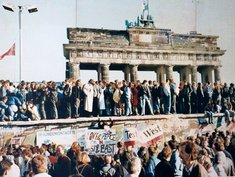|
Question or Term
|
Answer
|
|
The country which dismantled its border fence with Austria in April 1989 (largely a symbolic move by the reformist government) encouraging thousands of GDR citizens to enter the country as a pretext for going on holiday in order to get to the West, something the country explicitly allowed in September to alleviate pressure from the growing number of refugees (25,000 having fled by the end of the month)
|
Hungary
|
|
Leader of the SPD from 1946 until his death in 1952 who rejected unification of the party with the KPD, campaigning for nationalisation as well as a unified, neutral, and demilitarised Germany against Adenauer's focus of policy towards the West
|
Kurt Schumacher
|
|
A Bavarian party that shares its ideology with the CDU in the rest of Germany with whom they always run in partnership in elections
|
Christian Social Union
|
|
That the key points of which were to achieve peaceful and sustained reunification by; providing humanitarian assistance, continuing cooperation with the GDR (and expanding it subject to democratisation and liberalisation), forming a confederation with the aim of federation, unifying Germany within the framework of East-West relations, integrating the GDR into the common market, and accelerating European disarmament
|
Kohl's Ten Point Plan
|
|
That group whose support for the CDU was so crucial in establishing its popularity as they formed 45% of the FRG population, many Protestants being in the GDR
|
Catholics
|
|
A 1990-91 treaty in which the Four Powers relinquished all sovereignty over German and Berlin, Germany limited its armed forces, nuclear weapons were barred from the country, and Germany formally recognised its borders
|
Treaty on the Final Settlement with Respect to Germany
|
|
An extensive questionnaire devised by British though mostly American occupying forces to determine which Germans had been associated with the Nazis, eventually required of all Germans applying for work, ration cards, etc.
|
Fragebogen
|
|
That the origins of which were to clarify the FRG's establishing of relations with the Soviet Union as a singular act in recognition of its privileged status as an occupying power
|
Hallstein Doctrine
|
|
They whom began to fracture in 1945 as their unity had only ever been one of necessity against a common threat, fundamental differences remaining unchanged or having grown
|
Allies
|
|
The only leader of the Four Powers who did not show disquiet or alarm to Helmut Kohl's Ten Point Plan
|
George H. W. Bush
|
|
|
Question or Term
|
Answer
|
|
Gorbachev's 1986-91 policy of increased openness and transparency, encouraging public scrutiny and discussion to recognise and address the shortcomings of the Soviet system
|
Glasnost
|
|
Those GDR products which were notably of far worse quality than those in the FRG, an example being Trabant Cars
|
Consumer Goods
|
|
The heavily patrolled and restricted border between Eastern and Western Europe, effectively breached by Hungary in 1989
|
Iron Curtain
|
|
Those types of parties that have gained a foothold in eastern Germany since reunification due in part to being accustomed to strong central authority and resenting large foreign worker population brought in by the government, many Turkish
|
Extremist Parties
|
|
The year in which political parties and free trade unions were revived in both East and West Germany
|
1945
|
|
That policy of Willy Brandt's which tried to alleviate the fears and criticisms of the CDU by emphasising that though two states existed within Germany, they could not be 'foreign' to each other
|
Ostpolitik
|
|
The charismatic 'right-wing' SPD mayor of West Berlin who helped revitalise the party and unite it around the Godesberg Program in 1959, though not becoming leader until 1964
|
Willy Brandt
|
|
Those two conferences at which it was agreed Germany would be split from Austria, the two and Berlin being divided into four temporary occupation zones under a central Allied Control Commission responsible for governing, demilitarising, denazifying, decartelising, and democratising the country, chronologically
|
Yalta and Potsdam
|
|
Leader of the GDR from 1971 to 1989 who increased oppression against change, being a fierce opponent of Gorbachev's reforms (using propaganda to attack him), emphasising the GDR's position as the strongest economy in the Eastern Bloc
|
Erich Honecker
|
|
The December 1989 rebranding of the SED, abandoning Marxism-Leninism having rescinded the clause of the constitution defining the GDR as a socialist state under SED leadership on the 1st, ending the party's domination and seeing Egon Krenz and the Politburo resign
|
Party of Democratic Socialism (PDS)
|
|

